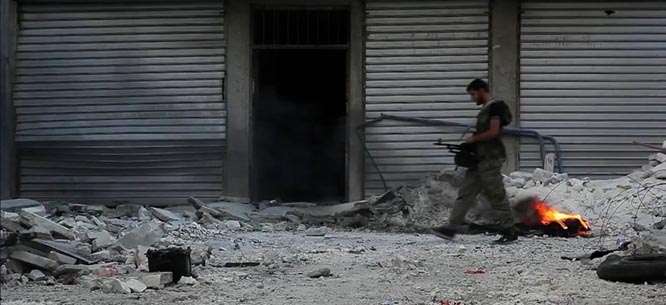Syria: What Ought to be Done?
Syria: What Ought to be Done?

Many people have been criticizing President Obama for dithering over what to do in Syria. Not me; dithering seems an entirely rational response to what’s going on there. The difficulty is that we don’t really know what we want to happen—I mean we don’t know which among the likely possibilities would be the least awful. Of course, readers of Dissent would be happy to see the victory of Syrians who have been studying John Stuart Mill or who take their cue from Swedish social democracy. But nothing like that lies anywhere on (or near) the horizon.
The possible outcomes are few and unappealing. The first is a victory for the Assad regime, which would probably bring with it a repression more brutal and bloody than the civil war has been and which would greatly strengthen the Iran-Hezbollah axis. The second is a rebel victory of the sort that we saw in Libya, with numerous militias and warlords (some of them jihadi militants) ruling different parts of the country, the army’s arsenal dispersed among them and among insurgents and terrorists outside the country, and the defeated groups—in this case Alawites, Druze, and Christians—radically at risk. The third possible outcome is a division of the country into a Sunni state centered in Damascus, an Alawite statelet along the coast, and an autonomous Kurdish region in the north. Who would rule in the first of these? Who would protect minorities in the first two of these? And who would deal with the destabilizing effects of the three of them together on politics in Lebanon, Turkey, and Iraq? Right now, no one can provide even remotely plausible answer to these questions. All in all, dithering makes a lot of sense.
Some of Obama’s critics think that we could pick one of the militias, or a small, coherent group of them, and make sure that it went on to win the war. That seems to me one of the less likely outcomes—given that we don’t know all that much about the different groups; and that our allies, Turkey, Saudi Arabia, and Qatar, have probably already picked groups that we wouldn’t want to win; and that the boundaries of the groups are highly porous, and the passage of weapons across those boundaries is beyond our capacity to control. In addition, it’s worth remembering that in an Iraqi election some years ago, while the United States was actually occupying the country, its candidate for prime minister came in third. The U.S. government is not very good at picking winners even when it is right there, with nearly 100,000 soldiers. How would it do operating from the sidelines, with a few CIA spies sending back reports on the political and religious views of this or that warlord—based, I suppose, on extensive interviews?
There are humanitarian measures that ought to be taken, on a far larger scale than anything seen so far. But they seem obvious, politically easy, and reasonable people might worry that humanitarian aid, while it relieves suffering and is morally necessary, may well prolong the war and produce more suffering, which will need more relief. Is there anything to do to end the war? Daniel Kurtzer, the former U.S. ambassador to Egypt and Israel, recently wrote a piece for the New York Times calling for more serious and sustained negotiations with Russia—and then with other countries too. Dithering in concert is better than dithering alone. The aim would be to find people on the two sides of the civil war who might come together to form a transitional government that would be, if only temporarily, acceptable to both—that is, acceptable to both if and only if both were under strong external pressure.
Since officers from the old Syrian army are now fighting some for the regime and some for the rebels, these are the most likely candidates for a transitional government. Presumably there are professional soldiers committed to civilian rule, who could act in good faith—in better faith than any of the religiously faithful—as a temporary junta. And then they could play a part in choosing their civilian successors. The goal should not be “free elections.” Elections only work, democracy only works, if there are political parties ready to share power with other parties or to rotate in office with them. Nothing like that exists in Syria today, where all the militants would rather die than rotate. The first civilian government should be chosen through negotiations, not elections. What is necessary is a non-sectarian government that can provide physical security and basic services for all Syrians and that can establish and maintain a monopoly on the legitimate use of force—in fact, on the use of force simply.
There is nothing that the United States can do by itself, with its mighty arsenal of weapons, to bring about a settlement of this kind. It would have to be the work of the Americans and the Russians and the Europeans and possibly the Chinese too. And in working it out, it would be helpful to bring in the two countries that have the most at stake in the Syrian civil war, after the Syrians, Iran and Israel. These two are already engaged, Israel from the air, Iran’s revolutionary guard on the ground. Excluding them from the discussions would be foolish.
Obama’s dithering, and everybody else’s, has allowed the war to be fought to a point that must be close to mutual exhaustion. So now may be a good time to come up with a proposal that would suit the various external powers and end the suffering of the Syrian people.
Please note: this isn’t a leftist proposal. It bows to imperial interests and it doesn’t hand power to the Syrian working class. It is, as we used to say, “reformist.” Peace comes first, stability, even “law and order.” Democracy and social democracy lie far down the road.
Michael Walzer is the former co-editor of Dissent.






